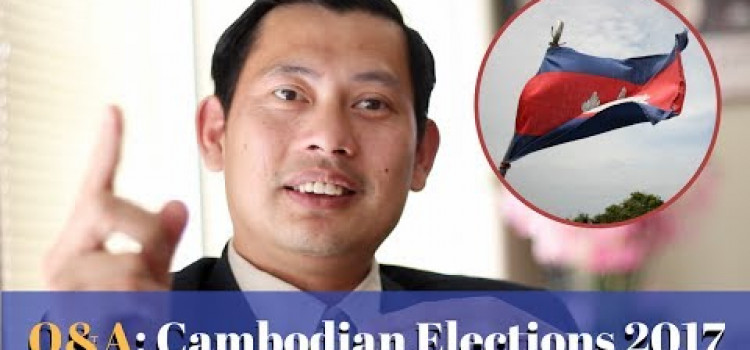

Cambodia is set to have its local elections on June 4 when voters will select new commune leaders. Cambodian democracy is fairly new, as multi-party elections began in 2002. The developments have some impression in Long Beach, which houses the largest Cambodian population outside Cambodia as the U.S. accepted many refugees after a genocide in the 1970s. Long Beach resident Sopheak Kheng serves as president of the Cambodian Coordinating Council, a nonprofit that organizes the Cambodian New Year festival, among other cultural events.
For those who don’t know, can you describe the brief political history of Cambodia?
In 1992, the United Nations came to Cambodia and it had the Cambodian country going back to freedom-becoming a real free country-by having elections where people can have the right to make decisions and choose their own leader. However, it was a problem at that time for a lot of people because they were lacking education, lacking knowledge, and lacking resources.
Much like how people in the U.S. face problems, can you talk about any social problems Cambodian people experience over there?
Yeah, I can say that based on my experience, based on my knowledge, and going through some of the difficult times, any country, it’s not always Cambodia, already have an issue with the lacking of education. Some of the funds cannot be put in the right place… When I got out of the killing fields [The Khmer Rouge genocide], about five years later we did the census… About 85 percent of Cambodians at that time didn’t know how to read and write. But if you look at the census from five or 10 years ago, it’s only about less than 25 percent of people who don’t know how to read and write. So, it’s a huge gap. A gap that has a good path coming out.
…Every country has a bad path. I don’t think that any type of government in the world isn’t involved with corruption, cheating, stealing and lying. That’s part of humans living life. Cambodia is the same way too, but I can say that right now they try to make it right.
Do you or your family recount participating in elections in Cambodia in the past?
Yes, we were always there. Our family is among the Cambodian families that believe that they have the freedom to vote. We need to do it. Otherwise, other people won’t know anything about it… We always lined up [to vote]. We were always taking time off from work, from family time. We traveled far away. I went walking. We would be waiting hour after hour. And even when it would be raining, we still believed that whatever voice we put on there can make change to make good for the whole country.
Given that Long Beach has the largest Cambodian population in the U.S., what kind of relationship do you think the Long Beach community keeps with the politics of Cambodia?
Cambodian people in Long Beach focus more on their relationship with culture, heritage, and human rights.
Why should Cambodians who’ve created a new life in the U.S. care about the elections and the political climate in their homeland?
I can see from their mindset, from their hearts that no matter how they get away from those difficult times and come here to have a better life… their heart, their brand is still Cambodian. They’re still loving their own nation. And a lot of them, many of them still have their family back there. That’s why everything that they can get, everything that they can grow, they still try to respond, try to do something, and help them back to their homeland. So that’s what I can see. And because of their family there, they have some story to tell. That’s why it hurts them. For me too, if something’s not right with my family back in Cambodia, it means my heart is broken, too. I will be sad, too. And I will be more sad if in some election, if some government or other party just took [power] and instead of making change to be in the right direction they go into the wrong, off-road, and make things more worse.
Can you describe the differences between the Cambodian People’s Party and the Cambodian National Rescue Party, which are the two major political parties in Cambodia?
The Cambodian People’s Party has been sitting there in the position [of power] for a long time. A while. Many of those leaders already have a strong connection and relationship with the people. They feel comfortable already. The other party, the Cambodian National Rescue Party, is just trying get growth; they try to get the votes and bring everything together because I believe that one thing they want to see is change. For me, changing is not important because no matter what, whoever comes up to sit in the chair, sit in the position, if they don’t change from the inside-out, I don’t think it’s going to be better. If they start to make change from the inside, no matter how long they sit, they will be ready to focus on the right path and then the people will receive a lot of benefits. And that’s what we want to give to the people. Why do we have votes? Why do we need votes? …Because we want to see something change… Most parties, they try to show off their power. They give away and promise all things. But at the end of the day, what is the benefit to the whole entire Cambodian people?
You have a lot of family over there still?
Yes. I’m the only here in the United States. All my brothers and sisters, my mom, are back in Cambodia… I just came here about nine years ago to the United States. At that time, I didn’t speak English at all. I couldn’t even read the signs on the street. But I just tried to survive…
What is your stance on the United States’ involvement in Cambodia?
I believe with the help of the Congressman Alan Lowenthal [who represents Long Beach] and the U.S. government, it puts everything together. It’s a way to wake the people that are sleeping in Cambodia to help make sure that people get the right resources from donors. And the Cambodian people can grow because the United States is the biggest country, we can say, the biggest powerful country around the world. If we take some good from the United States and place it in Cambodia, the Cambodian government and the Cambodian people will be getting it the right way.
This interview was edited for clarity and brevity.
Click here to learn more on Cambodian history.
CORRECTION: An earlier version of this article incorrectly stated that Cambodia was voting for a new prime minister on June 4, 2017. Instead, the Cambodian people voted for local commune leaders from differing political parties. Cambodian prime minister elections will take place in 2018.
